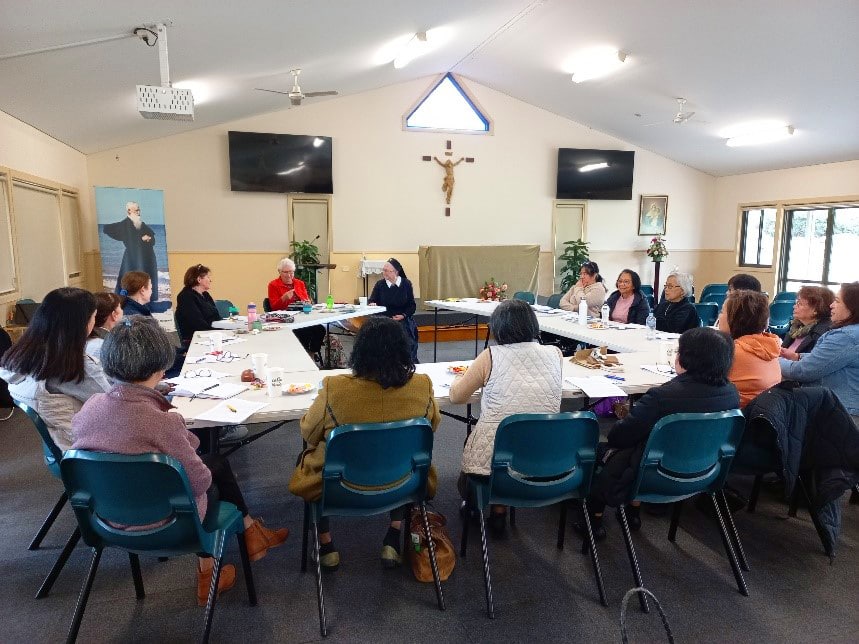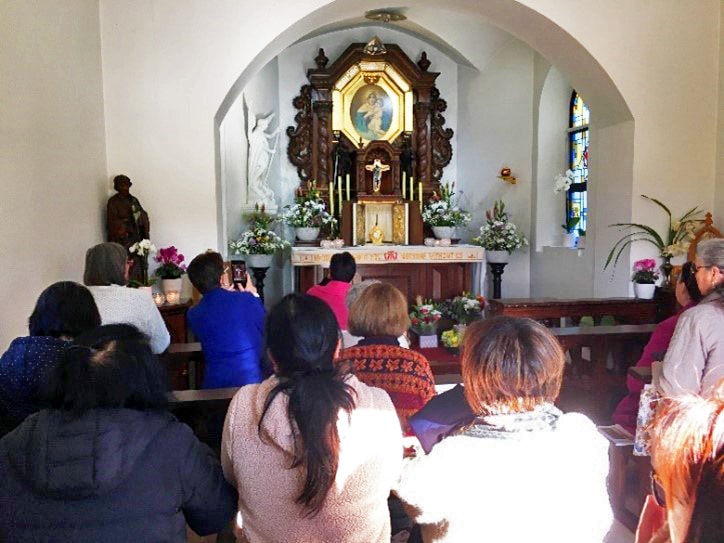On Saturday 12th August, approximately 20 women from the Womenʼs Branch from the Sydney area came together at Mt. Schoenstatt, at Mulgoa for a time of formation. They normally come together four times during the year for formation in Schoenstatt’s spirituality.
Sr. M. Elizabeth Foley who presented the day, began by showing a video about the 31st May, 1949, the events leading up to it and those following on from it in the life of Father Kentenich. She explored further the historical context surrounding Schoenstatt’s Third Milestone.
After a broad analysis of these connections, the group shared some examples specifically relating to Primary causes and secondary causes in relation to practical everyday life. For example, think of a person, in isolation from family, friends and colleagues and how this might seem the best way to understand the “essence” of the person. But can a person be truly understood without knowing their family and friends? In the same way, it’s possible to go straight to Christ, or the Heavenly Father, but it is a much richer experience to come to Christ through Mary, and together they lead us, through the Holy Spirit, to the Heavenly Father.
Women as God’s reflection to the world
The women looked at the role of the father in the family. If the father is no longer seen in the right way, then Godʼs Fatherhood is not understood in the right way. The same applies to the role of the mother in the family. Both the mother and the father are “stepping stones” leading their family to God. It is through the parents, that the child learns about God and is led to God, and to Mary, said Sr. M. Elizabeth.
An interesting aspect of the day for the ladies, was looking at the role of women in relation to mechanistic thinking as opposed to organic thinking. For example, if I am a woman, I must recognise what my task is as a woman, within the framework of creation. I cannot try to do this as a man, or in a manly way. In this way I become a ʻsecondary causeʼ in fulfilling my proper function in relation to others.

The woman to a large extent influences society and culture
With this in mind, they looked at the statement that today many women donʼt want to be ʻlike Maryʼ. They donʼt see Mary in her rightful place nor with the right attitude. For example, they may see her as a ʻhandmaidʼ, meaning for them, a ʻservantʼ, a ʻslaveʼ to others. They don’t see Mary as a strong, dignified woman as was exemplified through her life. This loss of identity of womanhood has corroded the image of women in many ways, yet it is the woman who often influences the man, and it is the woman who to a large extent influences society and
culture.
In her relationship to God, a woman should be a child of God. Just as Mary was the handmaid of God in her childlike attitude, so too women should embody childlikeness. Sr. M. Elizabeth shared how important it is for women to be true children of God, to be able to be children with each other. Not childish, but coming together and enjoying each other’s company on a more natural level . They agreed it can not only allow them to get to know each other much better, but also help them to grow together as a community.
A real gift for the womenʼs groups
It was a day of real ʻformationʼ for all who attended, whether newer to Schoenstatt, or having been part of Schoenstatt for some time. It is always a joy for members of the various groups to come together and share their knowledge, their experiences, and their gifts. This has been a real gift for the womenʼs groups in coming to know each other and form a true Schoenstatt community of women.

The day finished with time of prayer in the Shrine in which the group gave thanks to Our Blessed Mother for all her help in these turbulent times, in helping each one to rediscover their womanliness and motherliness, and to ask Our Lady to help them live their mission in a truly Christian and authentic way.
